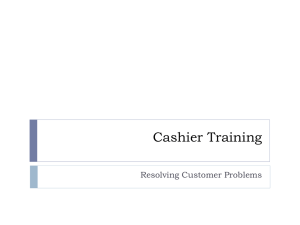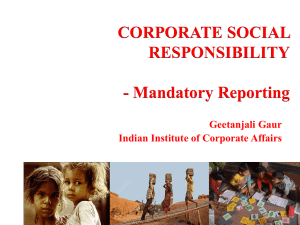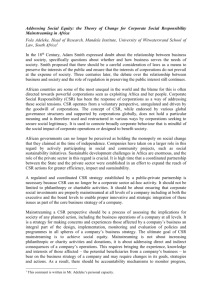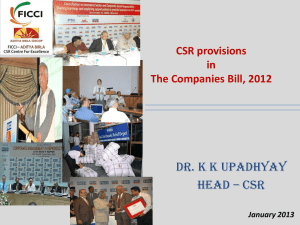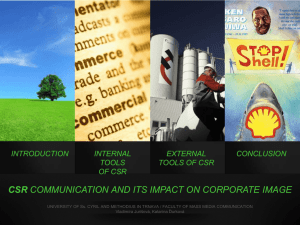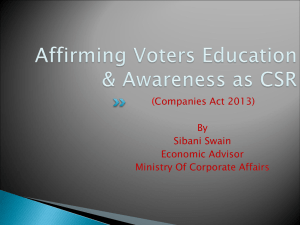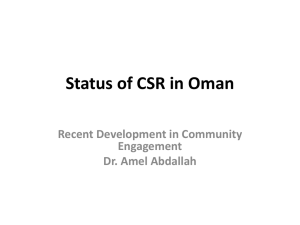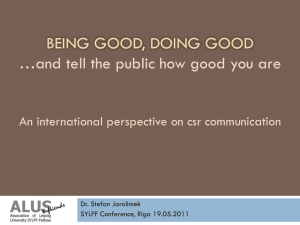the 2nd annual corporate social investment business summit 2013
advertisement
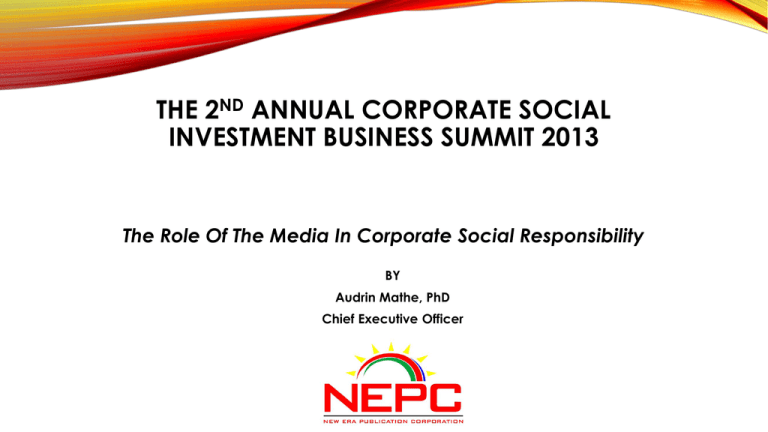
THE 2ND ANNUAL CORPORATE SOCIAL INVESTMENT BUSINESS SUMMIT 2013 The Role Of The Media In Corporate Social Responsibility BY Audrin Mathe, PhD Chief Executive Officer 1. INTRODUCTION The media in a democratic society has an important function to provide the citizens with timely and accurate information as well as to furnish them with poignant elaboration and analysis of the issues involved. We will therefore deal with: a) How is the media currently treating CSR and how might it cover CSR in future? b) What are the media's own Corporate Social Responsibilities? c) What is the impact of new media in terms of reporting CSR? d) What are the Corporate Social Responsibilities of the Media? 2. HOW THE MEDIA COVERS CSR There are four different types of information demands that people express: a) Producers want data that help with their business and production decisions. b) Consumers want news about prices and quality to help with purchase decisions. c) People pursue some information simply for entertainment and diversion. d) Voters and citizens need information to help them make informed choices in politics. CSR stories contain elements of all four information demands. Managers in some industries follow CSR stories to anticipate how their companies may be affected. Consumers may read about green products or individual investors may search out information on socially conscious investment funds. Reporters aiming to satisfy entertainment demands can frame CSR stories as about human interest, drama, scandal, violence, corruption or protest. Because CSR stories often revolve around policy issues such as pollution or sustainable development, they also contain elements of public affairs coverage. To the extent that CSR involves public policy issues, however, coverage will be affected by rational ignorance. Even if individuals care a great deal about sustainable development or social policy, the likelihood their political action will make a difference leads them to remain rationally ignorant about details of these policies. This implies that journalists will not invest in story development or gather the skills necessary to cover policy details. This means that policy stories will be under covered in the media because individuals do not take the time to invest in learning about decisions they cannot influence. 3. THE MEDIA’S ROLE AS CSR CATALYST Apart from creating appealing and conscious advertisements, corporations must enlist the cooperation and support of media in spreading awareness about CSR to the people at large. In the final analysis, CSR is all about helping society look beyond profits and hence the media (which is a guardian of public good) has a stellar role to play in this endeavor. a) The media can be used to seek volunteers from the society or the specific places where the corporations are launching their CSR initiatives. a) Further, they can be used to publish articles pertaining to the values and the mission of the company in promoting CSR. b) Apart from this, the media can also act as a conscience keeper by constantly reminding corporations about the need to give back to society and to look beyond profits. c) Finally, the media can also take a critical view of the CSR programs that a corporation claims to run and it can ensure that the corporation is not indulging in “Green Washing” which is the case where a corporation pretends to follow CSR but in reality does not do so. 4. THE FUTURE OF CSR IN THE MEDIA a) Do corporations always act in the best interests of Corporate Social responsibility? b) Do corporations really care? c) Do corporations act deliberately when implementing CSR programs or the media influences them?

